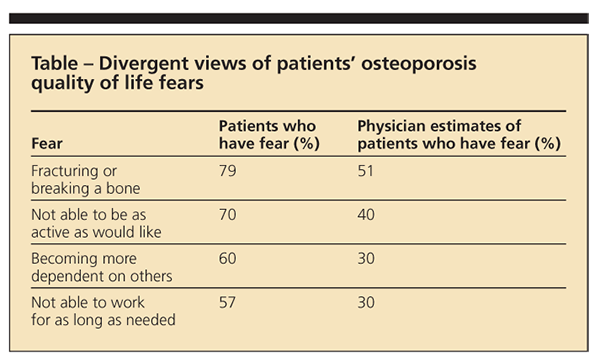Article
Survey results spur new osteoporosis management tool
Patients fear the impact of osteoporosis on their quality of life far more than physicians think, according to an International Osteoporosis Foundation (IOF) survey (Table), but they lack the information and tools needed to address their concerns and improve their osteoporosis management. As a result, the IOF launched a community-based networking program designed to promote better communication among patients with osteoporosis and their physicians and achieve improved understanding and outcomes.

Patients fear the impact of osteoporosis on their quality of life far more than physicians think, according to an International Osteoporosis Foundation (IOF) survey (Table), but they lack the information and tools needed to address their concerns and improve their osteoporosis management. As a result, the IOF launched a community-based networking program designed to promote better communication among patients with osteoporosis and their physicians and achieve improved understanding and outcomes.
The IOF survey, conducted in 13 countries across Europe and Australia, included 844 women older than 55 years with postmenopausal osteoporosis and 837 physicians, both general practitioners and specialists who manage osteoporosis. The results revealed that patients with osteoporosis not only have greater fears than physicians realize but also are not as well informed about their disease as they think. For example:
•More than 90% of surveyed patients with osteoporosis correctly described the condition. However, 57% of patients thought that having osteoporosis is "just part of getting old," and one-third could not identify any of the risk factors.
•More than 4 of 5 surveyed patients confirmed that they are informed by their physicians about the importance of adherence to osteoporosis treatment, and 87% of the physicians confirmed that they provide their patients with this information. However, about one-third of patients admitted to discontinuing their treatment (for an average of about 5.5 months, which was 2.6 months longer than the physicians estimated) and almost as many did not think that occasionally missing a dose of medication is a problem.
The IOF’s new networking effort, OsteoLink, is a response to patients’ unmet needs in osteoporosis management as highlighted by the survey findings. The program will provide dynamic online and in-person network tools designed to improve communications about osteoporosis among patients and their family, friends, and physicians, including interactive Web content and an e-mail engagement platform. The ultimate goal is reduced fracture risk and improved quality of life.
For more information about the IOF and the program, visit its Web site at http://www.iofbonehealth.org. Or, contact the organization at International Osteoporosis Foundation, 9, rue Juste-Olivier, CH-1260 Nyon, Switzerland; telephone: +41 22 994 0100; fax: +41 22 994 0101.




